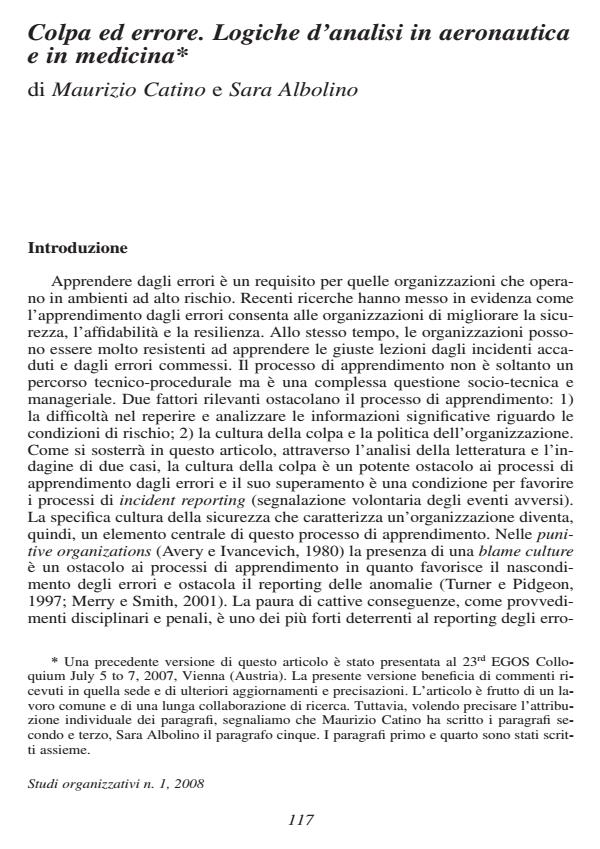Colpa ed errore. Logiche d’analisi in aeronautica e in medicina
Titolo Rivista STUDI ORGANIZZATIVI
Autori/Curatori Maurizio Catino, Sara Albolino
Anno di pubblicazione 2008 Fascicolo 2008/1
Lingua Italiano Numero pagine 28 P. 117-144 Dimensione file 177 KB
DOI
Il DOI è il codice a barre della proprietà intellettuale: per saperne di più
clicca qui
Qui sotto puoi vedere in anteprima la prima pagina di questo articolo.
Se questo articolo ti interessa, lo puoi acquistare (e scaricare in formato pdf) seguendo le facili indicazioni per acquistare il download credit. Acquista Download Credits per scaricare questo Articolo in formato PDF

FrancoAngeli è membro della Publishers International Linking Association, Inc (PILA), associazione indipendente e non profit per facilitare (attraverso i servizi tecnologici implementati da CrossRef.org) l’accesso degli studiosi ai contenuti digitali nelle pubblicazioni professionali e scientifiche.
The aim of our paper is to explore the cultural factors which encourage learning from failures and from anomalies in two different organizational contexts: the Italian Military Aviation System and the Italian Healthcare System. We used the two different cases to focus on the relationship between organizational learning from error and the role of blame culture. In the Military Aviation System, learning from errors is based on some socio-technical factors which favour the diffusion of a no blame culture. As result the accident’s number is decreased. In the Italian Healthcare System, there is a consolidated traditional safety culture based on, when an accident happens, the blame and the sanction falls on the single operator. This organization is characterized by many different social, cultural and organizational factors which inhibit the diffusion of a no blame safety culture. The analyzed cases show two ways of looking at errors and accidents: the healthcare system is still characterized by the person approach, where errors and accidents are caused by negligence of people working at the sharp end; the aviation is characterized by a system approach where accidents are socially and organizationally constructed. The analysis of the two different experiences show that in order to learn from errors it is necessary to adopt a system approach based on the development of a reporting systems and on the promotion of a no blame culture where the errors are not punished. A reliable safety culture requires: a strong commitment of the management; preoccupation with failure and a social awareness; norms and rules for safety which are feasible and flexible; a continuos monitoring of the working practices and the implementation of systems for feedbacks.
Maurizio Catino, Sara Albolino, Colpa ed errore. Logiche d’analisi in aeronautica e in medicina in "STUDI ORGANIZZATIVI " 1/2008, pp 117-144, DOI: